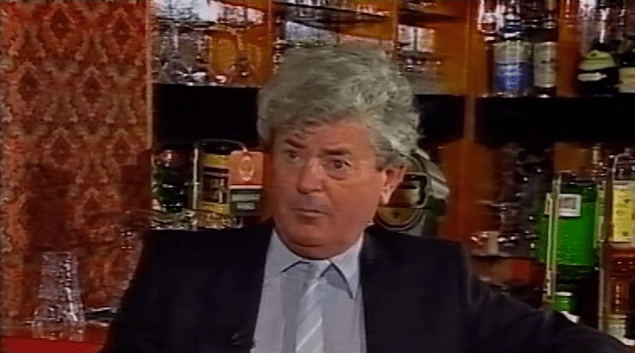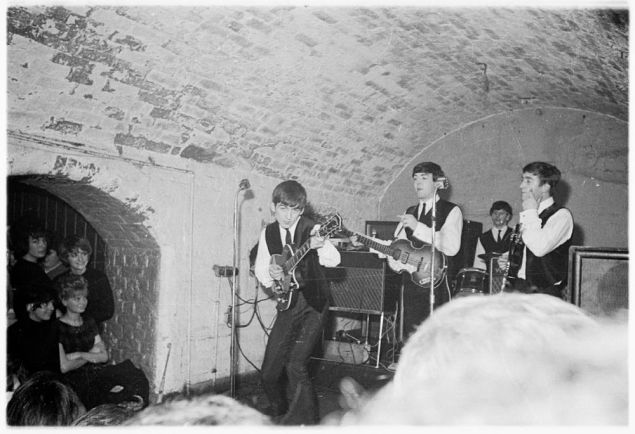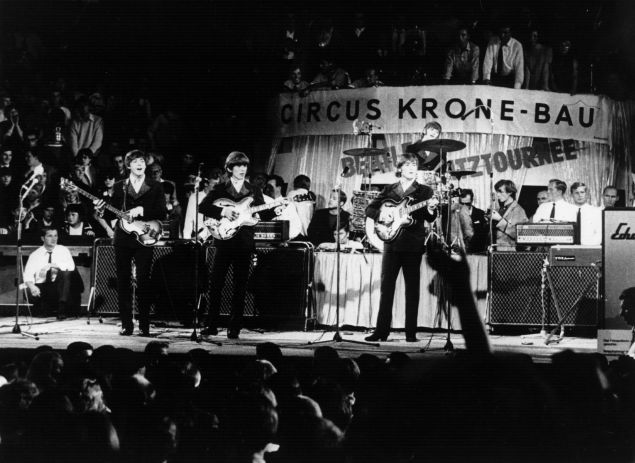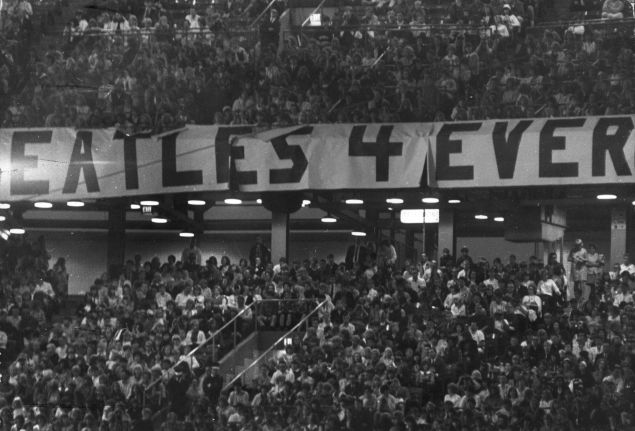
History is a playground-abused soccer ball, touched by 88,000 grubby fingertips.
Multi-dimensional, vastly panoramic, and full of lies and optical illusions, history can never be tacked flat to the wall: I suppose this is why you rarely see ninth graders with posters over their frilly pink beds of the evacuation of Dunkirk or the surrender of the Army of Northern Virginia at Appomattox Courthouse. However, myth, and the pop that comes before complicated desire, can be leveled, smoothed, and suitable for framing. But try framing a soccer ball!
This particular sphere is larger than Everest (yet simultaneously as tiny as a perfect sugar grain, because it is familiar and sweet on each and every one of our lips). The titanic, light-speed-spinning orb we call the Beatles. Look below it, and you’ll see it balances on the out-stretched index finger of a short Welshman named Allan Williams.
Of all the many fingers of fate, fickle and ridiculous, proud and pitiful, that the Beatles caldera-sized soccer ball balances on, Williams is one of the most important.
Allan Williams died this past Friday, December 30, at age 86.
The Beatles’ unprecedented, seismic success and their filigreed, finessed swatches of pioneering rock and pop had an infinite amount of mothers and fathers. Like every life, like every work of art or music, like every scrape, scream and sigh of history, the Beatles are the product of thousands upon thousands of accidents, disappointments, coincidences, traffic lights not made, busses missed, pauses when history was changed because one person was searching for sugar for their tea.

Every life is crocheted by these accidents of fate and time, every single failure or achievement is a trial with a jury of half a million men and women noting every flutter of the butterfly’s wing (and every subway door slid through just in time). Consider the continuous, constant, staggering interaction between the 37 trillion cells currently sailing on waves of fiber and plasma in your body, right this very instant; remember, just as many forces and factors and coincidences and catastrophes shape every life, every career, the fortune and destiny of every star and every UPS man, every criminal and every Christ, every substitute teacher and every Beatle.
Chance, baby, it swings like a pendulum. We usually don’t hear about it, because chance’s babies don’t always grow up to be gods. But it so happens we know a lot about the Beatles, so we can document the agents of their fortune.
A fascinating book would detail everything that went wrong and everything that went right to make four extraordinary ordinary young men “The Beatles,” and not, say, The Undertakers or The Swinging Blue Jeans. When that tale is told, Allan Williams would be as important as any man or woman in the story.
Allan Williams was the Beatles’ first manager. The beta version of the future beat gods caught his eye sometime in late 1959 or early 1960 when they first performed at the Jacaranda, a legendary Liverpool coffee bar run by Williams and his wife, Beryl.
In the first months of the new decade, Williams helped the trembling and formative band (then comprised of Paul McCartney, John Lennon, and George Harrison) become a more reliable gigging outfit by procuring them a steady drummer (first Tommy Moore and then Norman Chapman, before settling on Pete Best). He then turned them into professionals, and gave them invaluable performance experience by booking them regularly in Liverpool and other venues in the North.

Many accounts (most significantly the exhaustively detailed work of Mark Lewisohn) present a picture of the formative (‘58 – ’60) Beatles as amateurish, transient, and far from the charismatic and career-centric rock group that emerged by mid-1961; almost without a doubt, Williams was the missing piece, the catalyst who offered gigs, focus, and the framework of professionalism to the fascinating but scattered dreams of John, Paul, George, and Stuart Sutcliffe (who joined the Beatles in early 1960, not too long after Williams had hired him to paint murals at the Jacaranda).
(The definitive account of the Beatles’ earliest years and Williams’ role in their gestation can be found in Lewisohn’s Tune In: The Beatles: All These Years, Vol. I.)
Perhaps most significantly, without Williams, we don’t have the myth—and the reality—of Hamburg.
The reality: Any Beatles scholar, any student of rock history, even the Beatles themselves, will tell you that 18 months of very hard work in Hamburg made the Beatles “the Beatles.” And Williams is largely responsible for bringing the Beatles to Hamburg.
But “Hamburg,” the reality that Williams made possible, is also an essential rock myth.

In the rock lexicon, Hamburg doesn’t just stand for a briny and rust-colored port city in northern Germany, with a legendary red light district famous for its lollipop-colored lights and windows full of working girls; “Hamburg” also stands for any place where a band paid its dues and learned its craft, any place where boys or girls with guitars grunted and ground out rock ’n’ roll, any place where young musicians stood in the shadow of the myth of the Leather Beatles and made a hoarse, lusty, raw teenage sound that was loud and beery and constant and twisted like an Italian cigar and streamlined like an airstream.
Allan Williams gave us that myth.
Virtually every single working band has its own Hamburg, and can tell you exactly what the idea of Hamburg means. It means you are on the wrong side of the tracks in a cellar full of noise on a rainy night beating an e-minor chord to death in front of a dozen indifferent drinkers and three or four people who are actually excited to hear you (who, a week or four later, turn into 12 people who are very excited to hear you, and two weeks after that 36 people, and so on).
There is a time in the young life of each and every rock band where they are conscious of the legacy and legend of the Beatles in Hamburg, playing for eight hours a night in the crypts and saloons of Hamburg’s Grosse Freiheit, the brilliant neon scar at the heart of the Reeperbahn.
Hamburg, the reality and the myth, is virtually the invention—or more accurately, the discovery—of Allan Williams.
[youtube https://www.youtube.com/watch?v=4JhKYwHyoYU&w=560&h=315]
You can read about it elsewhere, but Williams and Lord Woodbine (more on him very shortly) stumbled across the adamantine idea of bringing real, live British rock ’n’ roll bands over to Hamburg to play for audiences hungry for English-speaking rock ’n’ roll. Perhaps someone else would have eventually stumbled across this same idea; but it was Williams who did it first, and far more importantly, since he was from Liverpool and since he managed the Beatles, he brought over the Beatles. Let’s put it this way: if someone from Glasgow or London had come up with the same idea, they wouldn’t have brought over the Beatles.
And without Hamburg, you don’t have the Beatles. You really don’t. This isn’t just because any good creation myth requires a humble manger at its beginning; its because Hamburg taught the Beatles to be a band.
The long nights in Hamburg created the Beatles’ peculiar mix of harmony and crankiness, rhythm and wit. They taught Lennon and Harrison to redefine the interplay of rhythm guitars. They encouraged Lennon and McCartney to blend sweet Everly vocals with Vince Taylor hysteria and Little Richard huzzah.
Without Williams, you don’t have the Beatles in Hamburg (I’ve said this multiple times in this piece, but it’s worth repeating, dammit). And without Williams, the Jacaranda, Hamburg, and the manifold crappy gigs throughout the north of England Williams procured for the Beatles in 1960 and ’61, you don’t have the cohesion and affect of professionalism that turned some snarky fans of American rock ’n’ roll into the biggest pop phenomenon of all time.
True, perhaps Lennon and McCartney might have gone on to great things, together or individually; but we have Williams to thank for making John, Paul, and George into an ambitious and functioning unit of music and commerce, into the historic Beatles.

In addition—and I think this has been largely overlooked—there were elements of Williams’ character that I think helped define who the Beatles would become, throughout the rest of the 1960s and beyond. Williams, a Caucasian Briton who was married to an Asian and whose friend and frequent co-conspirator, Harold Adolophus Phillips (“Lord Woodbine”) was Jamaican, provided a model of tolerance and diversity that was greatly lacking in England in the late 1950s and very early 1960s; I have little doubt this impacted the Beatles’ worldview.
Listen, I have had—and will continue to have—great problems with the deification of the Beatles. Their massive, unprecedented visibility has made realistic dialogue about their catalog and their role in our culture virtually impossible. But unlike other god stories, this one is fairly acutely documented; therefore we know what an essential role Williams played in creating this magical, hugely consequential cultural leviathan.
We do not always stand on the shoulders of giants. Sometimes, giants stand on our shoulders. The Beatles, this giant force in our lives and the lives of anyone who speaks the language of pop and style, stood on the shoulders of Allan Williams.

